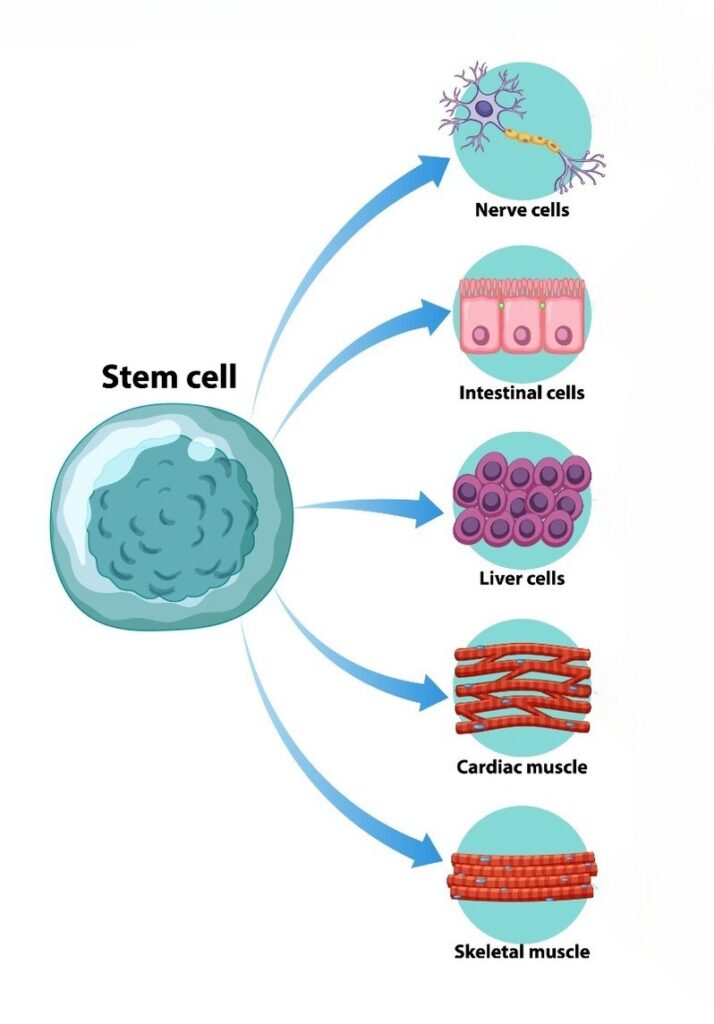Can Food Choices Naturally Boost Your Stem Cell Production? Here’s the Truth!
We often hear about stem cells in specific medical contexts, such as childbirth or advanced cancer treatments.
However, did you know that every one of us is built up of stem cells? Yes, you read that right!
Stem Cells are the building blocks of our bodies!
Present in every organ and tissue, unlike specialized cells, stem cells have the remarkable ability to develop into various cell types. Our immune system, often in the limelight, relies heavily on these versatile cells for optimal functioning.
Stem cells play a pivotal role in the formation and maintenance of organs, ranging from the heart and liver to the eyes, hair, and skin.
In fact, when the sperm meets the egg, it’s not just the start of a new life but also the combined work of stem cells and angiogenesis (the formation of blood vessels) to create the structure of a fetus.
The real marvel of stem cells becomes apparent when the body signals the need for repair.
Stored in the bones, these cells rush like a swarm of bees out of your bone marrow to the site of damage, whether it’s a wound, organ dysfunction, or inflammation. It’s a natural repair mechanism that occurs daily within our bodies.
While a robust immune system is essential, it’s the quality of stem cells that determines our body’s ability to repair and regenerate.
Even the most potent immune system can only fight infections temporarily if it lacks the support of efficient cells.

The body’s constant regeneration hinges on the presence of these remarkable cells. For example:
- Your small intestine regenerates every two to four days
- Your lungs and your stomach regenerate every eight days
- Your skin regenerates in two weeks
- Your red blood cells regenerate in about four months
- And your immune cells, every seven days
This is the reason why you are not allowed to donate blood unless it’s after three to four months. This regeneration can only happen if you have stem cells.
Can we get more stem cells, or can we maintain the ones we already have?
The answer lies in our lifestyle choices. A healthy lifestyle contributes to the production of high-quality stem cells, ensuring our bodies can efficiently regenerate and ward off various health conditions.
Stem Cell Depletion 101
When we are born, our stem cells are at their peak. Picture it as the body’s reserve army ready to tackle any issue that might arise.
However, as the years roll by, especially during our teenage and young adult years, this cell reserve begins to deplete. Aging further accelerates this depletion, leading to a slower recovery process.
It’s a simple equation: the fewer the stem cells, the slower the recovery.
Here are two classic examples that illustrate their critical role:
- The plight of burn victims: Consider the burn victims, particularly those in the advanced stages three or four of burn injuries affecting the bone marrow. At this point, the damage extends beyond the skin, reaching the very core of stem cell production. The consequence – the body loses its ability to repair, protect, and support the immune system.
- The athlete’s need: Athletes, in particular, lean heavily on stem cells for muscle consumption and formation. Building muscle requires a robust supply of stem cells. Without them, the body’s ability to adapt and grow in response to training is compromised.
So, every activity requires stem cells!
And, every lifestyle choice you make has an impact on your cells.
But, before we delve any further, it’s essential to understand that stem cell regeneration plays a pivotal role in our body’s defense mechanisms.
Alongside processes like angiogenesis, DNA repair, maintaining a healthy gut microbiome, and a smart immune system, it forms a crucial part of our integrative approach to well-being.
Therefore, it’s important to be mindful of the lifestyle choices we make.
The Culprits: Unhealthy Lifestyles
While our bodies possess an innate intelligence for regeneration, certain lifestyles can hinder or even deplete our stem cell reservoir.
Smoking
Both active and passive smoking emerge as the top contenders in depleting the production of stem cells. It’s not just about compromised immunity – smoking hinders the ability of these cells to repair the damage inflicted on the body.

The consequences? An increased risk of cancers, heart diseases, diabetes, high blood pressure, Alzheimer’s, Parkinson’s, and more.
The body’s innate repair mechanism is compromised, leaving smokers and passive smokers grappling with difficulties in recovery. If you smoke, you may want to consider these 7 successful ways to quit smoking.
Heavy Drinking
Binge drinking and heavy alcohol consumption take a toll on stem cells, leaving the liver particularly vulnerable. Cirrhosis, or the scarring of the liver, is a direct result of the liver’s inability to repair itself.
The lesson here is clear – moderation in alcohol consumption is not just a matter of avoiding a hangover; it’s about preserving the body’s natural healing capabilities.
If you can’t avoid alcohol altogether, consider enjoying these healthy alcohols you can consume in moderation!
Chemotherapy and Radiation
While chemotherapy and radiation are critical in treating cancer, they also target and kill stem cells. Patients undergoing these treatments often face pigmentation issues, extensive pain, spasms, and muscle pains.

The key takeaway? Treatment effectiveness goes beyond the medical procedure itself – dietary and lifestyle changes are crucial for mitigating the collateral damage caused to stem cells.
This is why we actively encourage cancer patients to adopt a lifestyle that not only complements their treatment but also effectively manages its side effects.
Low levels of HDL (High-Density Lipoprotein)
Also known as ‘good cholesterol,’ HDL opens the door to a host of problems at lower levels. Beyond cholesterol concerns, low HDL levels impair the body’s ability to repair the heart, and blood vessels, and reduce inflammation.
Monitoring HDL levels becomes vital for a holistic understanding of cardiovascular and overall health.
Diabetes
Elevated blood sugar levels wreak havoc by destroying stem cells, setting off a chain reaction of inflammation. This inflammation leads to compromised blood flow, cell death, chronic ulcers, and, in severe cases, amputations.

The key to breaking free from this cycle lies not just in medication but in a fundamental shift in lifestyle. Understanding the root cause and making necessary lifestyle changes can pave the way to reversing type 2 diabetes and managing type 1 more effectively.
We Suggested THIS To Our Diabetic Clients For 8-10 Weeks and Voila!
Chronic Illnesses
It’s a cycle that keeps millions in a constant state of sickness, when the body’s basic needs are often overlooked, including stem cell regeneration. Medications may offer temporary relief, but the underlying issue persists.
You will still be sick unless you address the root cause of your problem and you solve it. So nothing can get better.
It’s time to step back and ask: Why isn’t my body healing?
The answer may lie in the absence of sufficient stem cells. You can get out of chronic illness by changing your lifestyle and working with your doctor to reduce your medication over time and prevent yourself from getting more and more issues.
If you’re stuck in chronic sickness, it’s time for an attitude check!
Other factors that deplete stem cells the quickest include chronic stress, sleep deprivation, a sedentary lifestyle, and even training with less recovery.
Now that we have discussed the problems, let’s move to finding ways.
Most Powerful Foods for Regenerating Your Stem Cells
Some of the most powerful and scientifically proven foods for regenerating your stem cells are already sitting in your kitchen. Here’s the list that contributes to the regeneration:
- Eggplants
- Bamboo Shoots
- Black Tea, loose whole leaf, served pure and unsweetened
- Green Tea
- Coffee (Pure whole bean freshly ground coffee without added sugars or milk)
- Dark Chocolate (Raw cacao, a key ingredient in dark chocolate)
- Carrots
- Celery
- Fruits (Kiwi fruits, apples, plums, pomegranates, apricots, berries, grapes)
- Non-GMO soy, consumed in moderation (about 20 to 30 grams a week)
- Herbs like oregano and thyme
- Nuts such as almonds, pistachios, and walnuts
- Turmeric
- Peppers – black, red, or yellow
Elevate your well-being with ethically grown fresh produce sourced from our wellness platform here.

While having a balanced diet is crucial for stem cell regeneration, remember to support it with quality sleep, adequate exercise, better emotional health, and reconnecting with your spirit.
The Bottom Line
Whether you’re in the thick of a medical problem or simply looking to prevent future issues, stem cells play a pivotal role.
You don’t need to be health-obsessed or follow every trend out there. Your body knows what it needs. Instead of overcomplicating things, understand the basics!
Supporting the intelligence of your body is as simple as focusing on the fundamentals of the wellness blueprint: immunity, angiogenesis, stem cells, gut health, and your DNA.
Use the knowledge of stem cells as a tool, whether it’s in your treatment plan or part of your preventive regime.
Disclaimer: The information provided in this blog is for informational purposes only and is not a substitute for professional medical advice. Always consult with a qualified healthcare provider or physician before making any changes to your diet or health practices.
Looking for holistic and integrative guidance for chronic diseases or stem cell regeneration?
We help you find a way.
Know more about our Wellness Programs here.
Set up a one-on-one consultation with our integrative team by reaching out to us at 1800 102 0253 or writing to us at consults@lukecoutinho.com.
|
From a pimple to cancer, our You Care Wellness Program helps you find a way Talk to our integrative team of experts today 18001020253 |









Leave a Reply